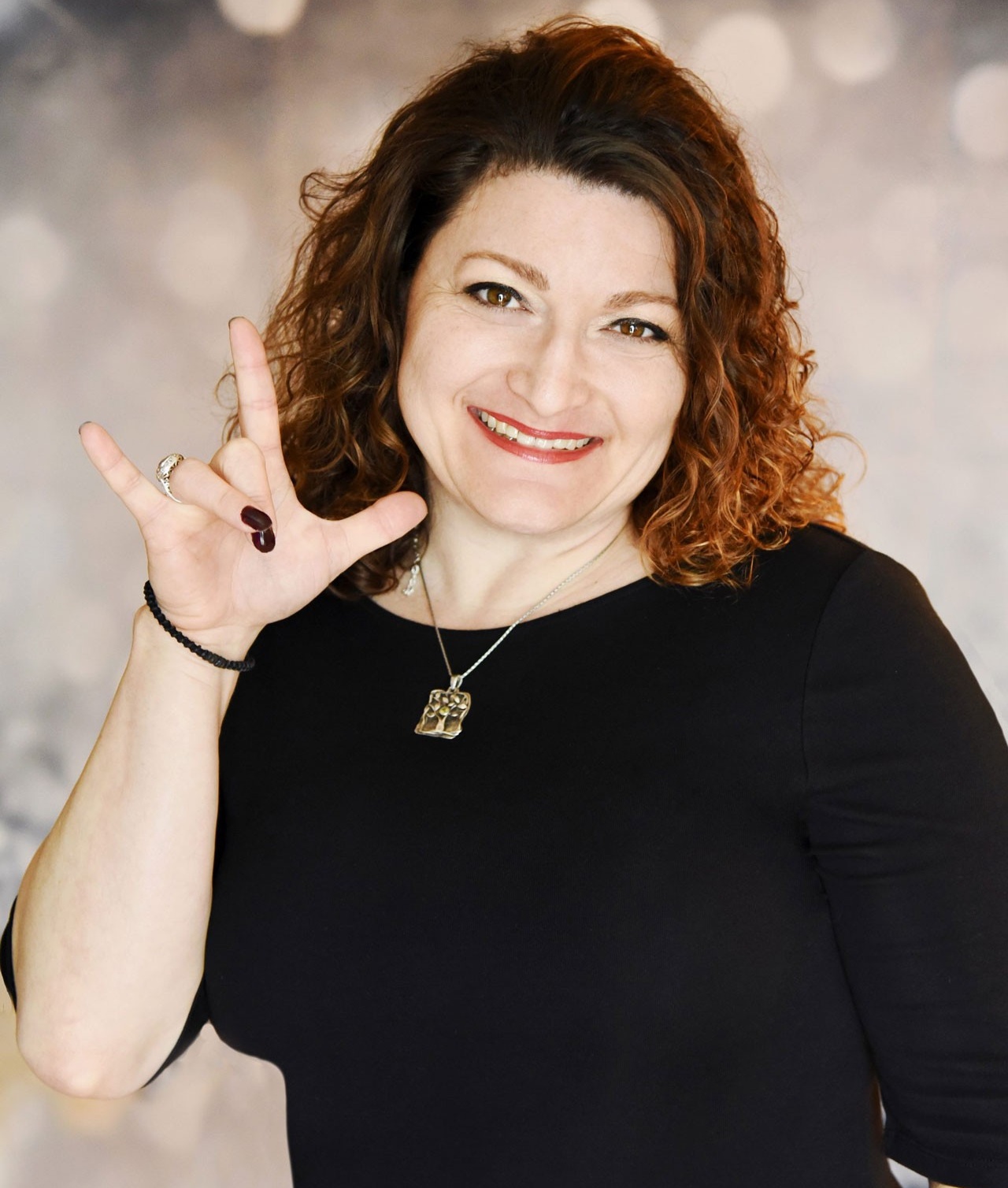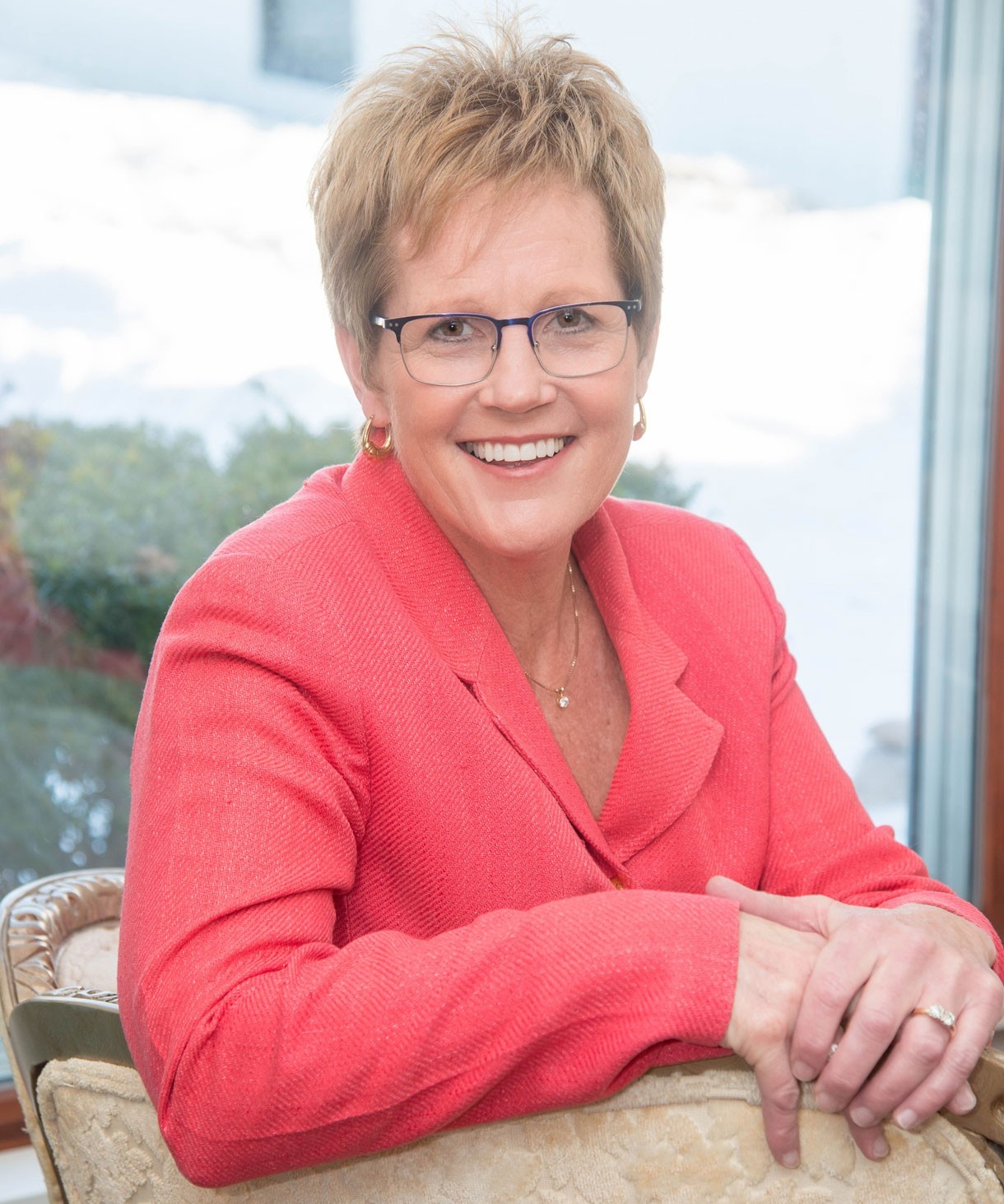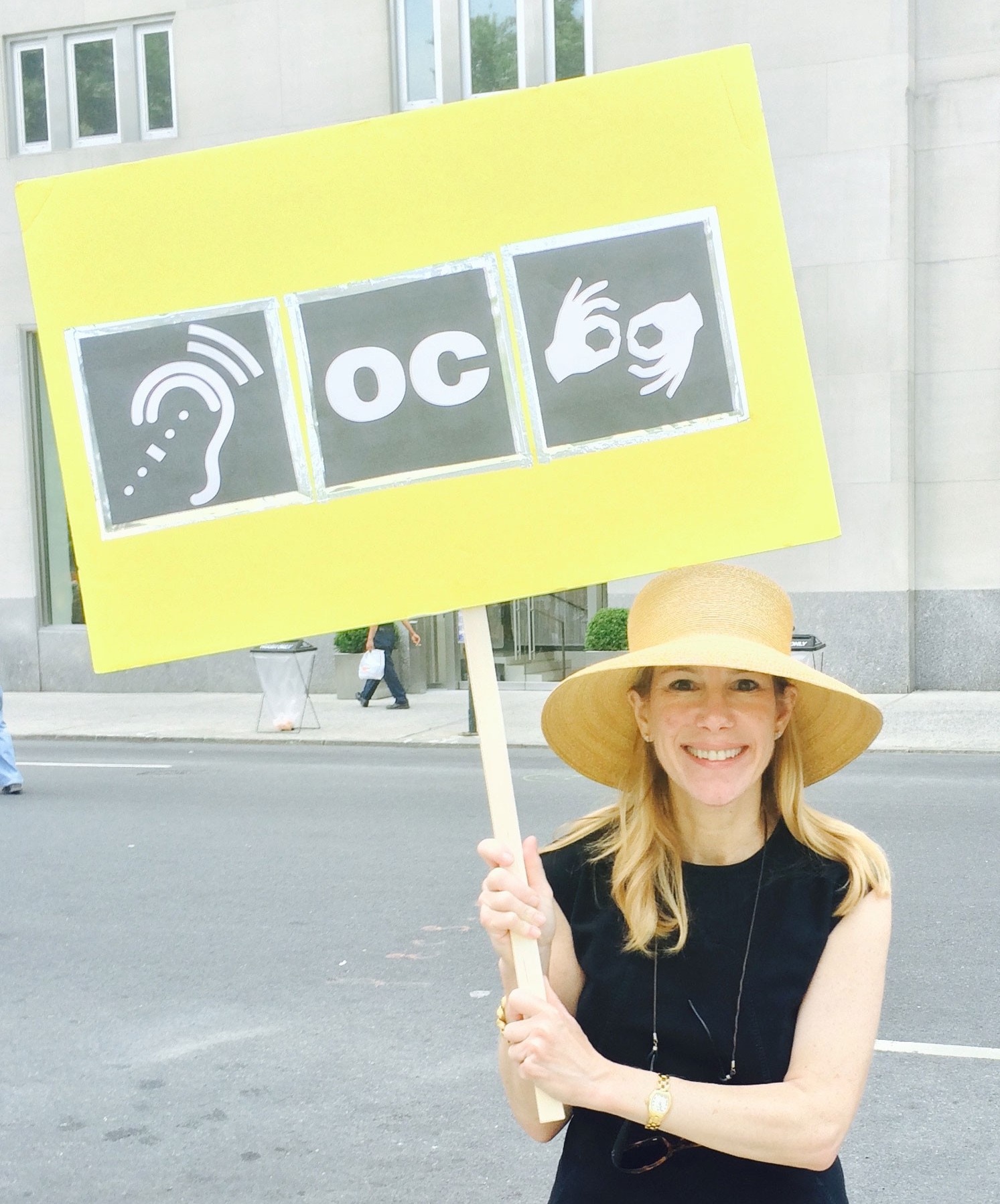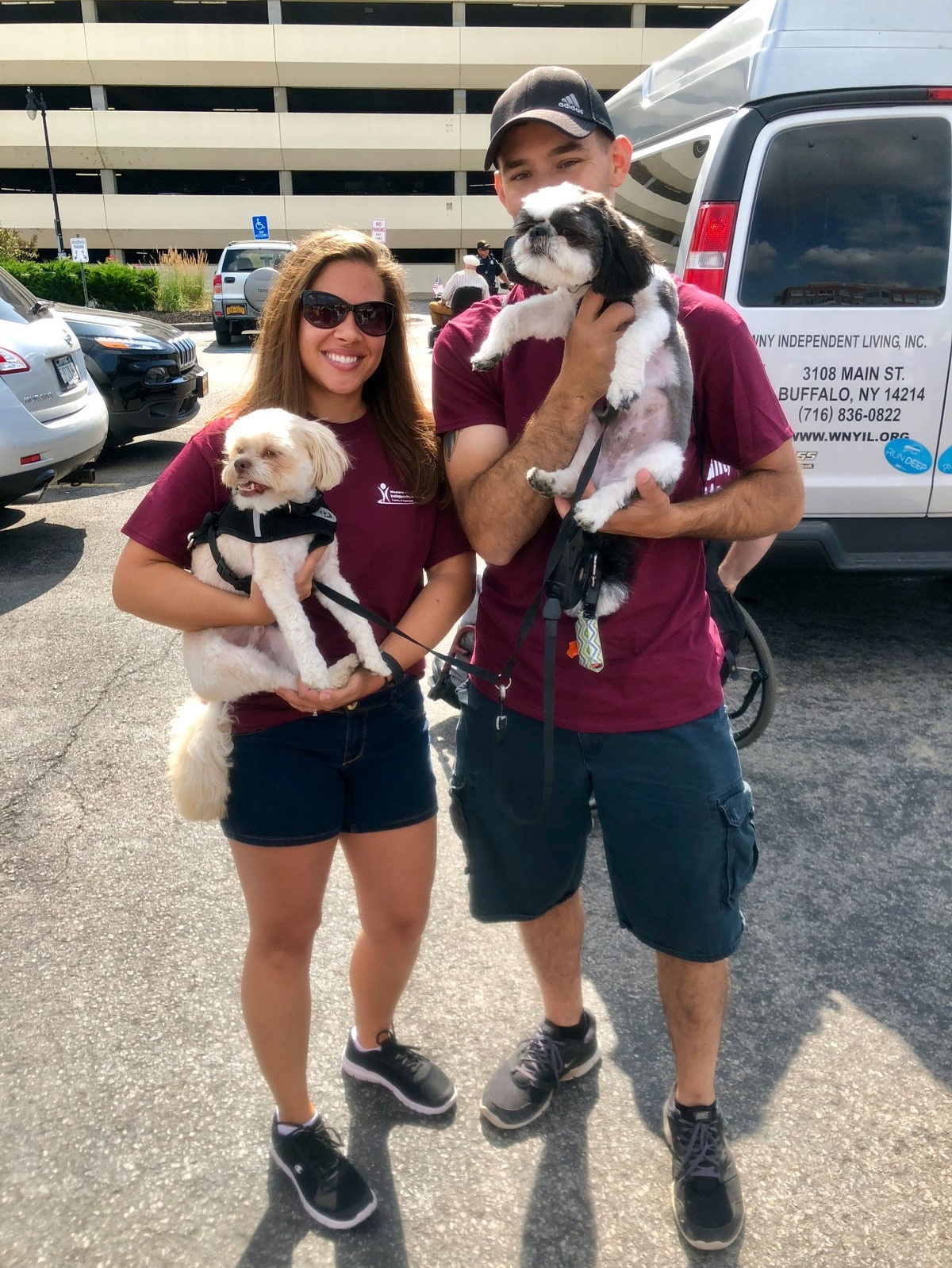The 'd' in diversity
How four alumnae are making an impact in the lives of individuals with disabilities
By Matthew Biddle
Lintz holds a sign with symbols that indicate the presence of critical accessibility services for people with hearing loss: assisted listening devices, open captioning and sign language interpretation.
Janice Lintz, BS ’84, vividly remembers the moment her daughter was diagnosed with hearing loss at 2 1/2 years old.
“Don’t worry,” the doctor said, delivering the news. “There are special schools for her.” Lintz couldn’t believe it: Not knowing anything else about her, the doctor had instantly marginalized her child—and Lintz set out to ensure nothing would stop her from achieving her full potential.
Initially, Lintz started advocating for hearing access at places her family visited near their New York City home.
“There were all these artificial barriers in place preventing us from going to theaters or museums,” she says. “A lot of it was entrenched ignorance—people weren’t trained properly, equipment was broken and nobody seemed to care. My job was to make people care.”
Eventually, Lintz thought bigger. She convinced Delta Airlines and the Taxi and Limousine Commission to add induction loops—which transmit sound directly to an individual’s hearing aid or cochlear implant—to airport terminals and thousands of New York City taxis, respectively. Lintz helped the National Park Service write its accessibility guidelines, testified before Congress, filmed a video for the United Nations and was twice appointed to the Federal Communications Commission’s Consumer Advisory Panel.
Along the way, Lintz also began advising organizations on improving hearing access and launched her company, Hearing Access & Innovations, in 2014.
“I often tell people that the ‘D’ in ‘diversity’ is for ‘disability,’” Lintz says. “Doing good and doing well are not mutually exclusive, but too many businesses view disability access as charity. When everyone cannot access your services, you’re losing potential customers.”
One in four Americans has a disability, according to the Centers for Disease Control and Prevention, ranging from observable mobility impairments to invisible disabilities of vision, hearing or cognition.
Meanwhile, 44,000 School of Management alumni live and work across the globe—and like Lintz, many are making a positive impact on the lives of individuals with disabilities through their careers and advocacy. Here are three more of their stories.
Changing the game
“I’m the pink elephant in the room,” says Alexandra Cartier, who is hard of hearing, summing up the frustration and isolation she sometimes feels during conversations. In meetings, for example, she may miss things as she turns to find the speaker and read their lips. Worse, during COVID-19, the necessity of mask-wearing makes reading lips impossible.
Through Zaniology Consulting, Cartier assists organizations with accessibility compliance and provides resources for communicating with people with disabilities in the workplace. To connect with other business owners, Cartier completed the Center for Entrepreneurial Leadership’s Allstate Minority and Women Emerging Entrepreneurs program in 2018.
“Everybody is a consultant, so I had to think about how to separate myself in the market,” says Cartier, a serial entrepreneur who also earned her BA from UB. “Who knows the market of people who are deaf or hard of hearing better? I understand what it’s like to communicate with a language barrier and decided I needed to solve this problem.”

Cartier also founded Vü, a startup that aims to help everyone “join the conversation.” Along with other products in the pipeline, Vü has one patent-pending technology ready for beta testing: the portable intelligent audio assistant, a pocket-sized device that lights up to show where sound is coming from, provides audio-to-text transcripts and stores those transcripts on a secure cloud.
“My company is about people helping people be people—to be independent, work independently and engage fully with others,” she says. “This is a game-changer.”
Taking charge
Jacobi with her husband and dogs at WNYIL's annual Disability Pride Parade.
As a UB student, Katrina Jacobi, MSW/MBA ’12, volunteered as a Big Sister and interned in the HR department for Big Brothers Big Sisters of Erie County. The experiences confirmed her passion for helping others and established her niche working behind the scenes to help nonprofits run smoothly.
Today, Jacobi serves as chief administrative officer for Western New York Independent Living (WNYIL), which provides an increasing range of services in 22 counties to empower individuals with disabilities. Among other tasks, she manages the agency’s 90-plus grants and contracts, and coordinates the activities of its board, committees and senior leaders.
“WNYIL was started by college students with disabilities who were sick of facing discrimination and lack of access, and decided to make their own opportunities,” she says. “We’re an eclectic organization, with the ability to create any service, whether one person or 1,000 people want it—as long as it allows individuals with disabilities to take charge of their lives.”
Overcoming obstacles
From her first jobs as an athletic trainer and physical therapist to her current role leading Visually Impaired Advancement (VIA), Tamara Owen, EMBA ’02, has always sought to help people overcome challenges.
“There's nothing more satisfying than removing barriers so people can be successful, and helping them have purpose and be a part of a larger solution,” says Owen, who also spent much of her career at the helm of several Buffalo hospitals.

Founded more than a century ago, VIA—formerly Olmsted Center for Sight—helps people who are blind or visually impaired achieve their highest level of independence. After joining in 2013, Owen has led the thriving nonprofit in providing vision rehabilitation, education and employment services to more than 2,500 individuals a year.
“I measure our impact through the lives of the people we serve,” Owen says. “When a child who is blind can participate in a classroom and in recess right alongside his or her sighted peers, that’s success. When we provide a machine operator or mortgage broker who is becoming blind with the tools and strategies to keep working, that’s success. It’s about every individual we can help live a joyful, purposeful life.”

